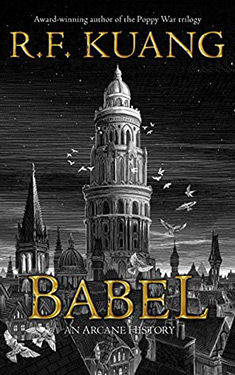RF Kuang
Completed 8/13/2023, Reviewed 8/13/2023
5 stars
This is a beautifully written alternate history of the British Empire in the 1800s, where the Empire has achieved its dominion through the use of magical silver and language translation. With themes of slavery, oppression, racism, sexism, and colonialism, it creates a personalized view of these -isms and reveals the haughty, narcissistic culture that Britian had in dealing with other nations it thought were barbaric. It’s also a metaphor for how we as modern nations still treat other countries and peoples, particularly in this time of the rise of Karens and other insidious white supremist thinking. This book won the 2022 Nebula, the 2023 Locus Fantasy Award, and was nominated for the 2023 World Fantasy Award.
Robin Swift is a Chinese boy plucked from Canton during a cholera plague by the mysterious Professor Lovell. He takes Robin as a ward and trains him in Latin, Greek, Chinese, and English. Lovell then gets him enrolled at University College at Oxford where he trains to become a translator and a manipulator of magical silver. While at Oxford, Robin discovers that there’s a secret society called Hermes whose mission is to undermine the magical silver industry that Britain uses to dominate half the globe. Robin is torn between his love of learning and languages and the battle against injustice. This comes to a head when Robin and his classmates go to China with the Professor to help translate between the local Cantonese government and the British corporations that are trying to sell opium under the guise of free market capitalism.
This book just astounded me. First it drew on my amateur fondness for languages and linguistics, then turned into a gripping tale of revolution and world peace and justice. I was also just amazed at how much I loved the prose. For a book not told in first person, it beautifully captured Robin’s character development from abused child to comfortable student to revolutionary. The prose also created three supporting characters of great depth and individuality: Ramy, a Muslim Indian; Victoire, a Haitian refugee; and Letty, a spoiled British Admiral’s daughter. Together with Robin, they all are language lovers and are honored to be at Oxford’s School of Translation, aka Babel. But this slowly deteriorates as they mature and have more exposure to the tenets of Hermes.
I did not really have much sense of what this book was about. Even the book’s subtitle, “The Necessity of Violence: An Arcane History of the Oxford Translators’ Revolution,” was rather confusing. This is the current read for my book club, and there was concern that this book would be pretentious, especially with a long title like that. But I found it personal and accessible and deeply empathized with the main characters. I don’t always like Regency British fantasy, finding it too haughty to tolerate. But it worked in well with the conflicts of Robin and his cohort. Professor Lovell is simply ghastly, typically bigoted, self-centered, and narcissistic, just like most of the faculty at Babel and the other students throughout Oxford.
I thought the world building was quite impressive, bringing in some anachronisms for which the author apologizes and explains in the forward. But it’s all so subtle, like the railway system being built a few decades earlier than in reality, and of course the tower of Babel in the middle of Oxford, which never existed. Kuang did a terrific job making it all seem natural and fluid. Add in the magical silver and you have a fantastical and oppressive empire in which it is easy to become complacent unless the country that’s being oppressed is your homeland.
I give this book five stars out of five. I was bowled over by how much I loved this book. Everything from the prose to the characterization simply worked for me. It’s a long book, over five hundred pages, and it took me a week to finish, mostly because work had me so exhausted during the week, I got almost no reading done until the weekend. I think some people might find it dry, especially the first half which features Robin and his cohort in their first three and half years at Babel. It’s a lot of detail about languages, their relationships, and the problems with translations. But I found it fascinating.

No comments:
Post a Comment